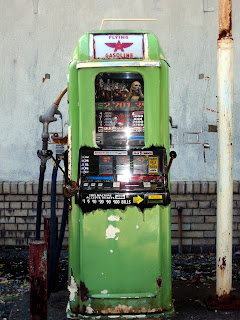Honorably sanctimonious
So here I am trying to elevate the tone of the Anti-Caption submissions, and mostly failing, but at least I was able to hit the desired unfunny note in the process.
Harebrained ideas or hairbrained ones, you decide.
So here I am trying to elevate the tone of the Anti-Caption submissions, and mostly failing, but at least I was able to hit the desired unfunny note in the process.
Labels: cartoon
With the price of fuel going up and up for the usual reasons, it seemed to me that a mashup of the one-armed bandit with the one-hose bandit might work.
You'd put your folding money in, take a pull, and see how many gallons you win. Fun for everyone!
I think it might work in Nevada, though not here in New Jersey or in Oregon because of the bans on self-service gas pumps.
Labels: automobile, business, money, photo
15px; margin-bottom: 15px; }.flickr-caption { font-size: 0.8em; margin-top: 0px; }
The past week's human rights protests at the sites of the Olympic torch relay made me think that one way they could avoid having to cancel the whole affair would be to parcel it out in a distributed fashion.